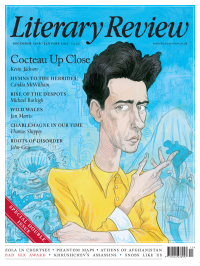Norman Stone
A Line in the Sand
The Man Who Created the Middle East: A Story of Empire, Conflict and the Sykes-Picot Agreement
By Christopher Simon Sykes
William Collins 368pp £25
We learn from this splendid and rather moving book that the original flag of what was to be Saudi Arabia was designed by none other than the British diplomat Sir Mark Sykes. Its four colours – red, white, green and black – now appear on the flags of the Arab states with whose creation he had something, directly or indirectly, to do: Iraq, Syria and Jordan (they also occur on the Palestinian flag). These colours originally stood for Arab unity, which in 1916 the British vaguely supported, whereas the French did not. The two powers eventually came to an agreement, named after its negotiators, Sykes and François Georges-Picot, a French diplomat, in May 1916. This is now much reviled as a symbol of Western meddling in the Middle East and, right enough, it appears to have been yet another of those fantasies that arose out of the First World War. When negotiations began in November 1915, the Gallipoli campaign was still going and the British expected to take Baghdad. It was presumed that the Ottomans would not survive and imperialist feet tapped. Picot wanted ‘nothing short of a French annexation of Syria’, a territory then understood to include Lebanon and Palestine. The British were agitating for the creation of a large, independent Arab state, to which Picot said, ‘You cannot transform a myriad of tribes into a viable whole.’ ‘Zones’ were eventually agreed. Sykes said, ‘I should like to draw a line from the “e” in Acre to the last “k” in Kerkúk.’ The French were to get Mosul as well as Syria; their zone of control was to extend well into central Anatolia. The Italians, as a reward for entering the war, were to get some of the rest. Later, the Russians demanded their share and were allotted northeastern Anatolia, then called Armenia.
The terms of the Sykes–Picot Agreement soon proved impossible to realise and Sykes himself repudiated them. The Ottoman Empire did not collapse as quickly as expected and when it did Russia was also in a state of crisis. The British found an ingenious way to do the French

Sign Up to our newsletter
Receive free articles, highlights from the archive, news, details of prizes, and much more.@Lit_Review
Follow Literary Review on Twitter
Twitter Feed
The latest volume of T S Eliot’s letters, covering 1942–44, reveals a constant stream of correspondence. By contrast, his poetic output was negligible.
Robert Crawford ponders if Eliot the poet was beginning to be left behind.
Robert Crawford - Advice to Poets
Robert Crawford: Advice to Poets - The Letters of T S Eliot, Volume 10: 1942–1944 by Valerie Eliot & John Haffenden (edd)
literaryreview.co.uk
What a treat to see CLODIA @Lit_Review this holiday!
"[Boin] has succeeded in embedding Clodia in a much less hostile environment than the one in which she found herself in Ciceronian Rome. She emerges as intelligent, lively, decisive and strong-willed.”
Daisy Dunn - O, Lesbia!
Daisy Dunn: O, Lesbia! - Clodia of Rome: Champion of the Republic by Douglas Boin
literaryreview.co.uk
‘A fascinating mixture of travelogue, micro-history and personal reflection.’
Read the review of @Civil_War_Spain’s Travels Through the Spanish Civil War in @Lit_Review👇
John Foot - Grave Matters
John Foot: Grave Matters - Travels Through the Spanish Civil War by Nick Lloyd; El Generalísimo: Franco – Power...
literaryreview.co.uk